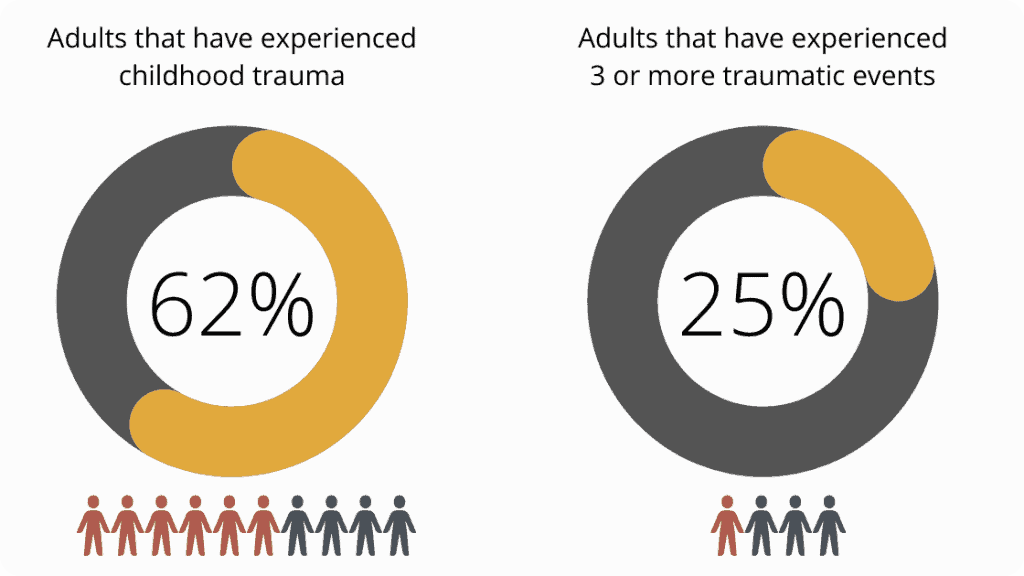We all have trauma. It can be trauma from our childhood, moving around a lot, relationships, intergenerational trauma (such as war), and the list goes on.
In this article, I will be exploring healing trauma with Shadow Work. I will also be sharing techniques and writing prompts to help you with your healing process.
Does Shadow Work help with Healing Emotional Trauma?
Shadow Work is a technique used to explore and heal the repressed aspects of your personality. The Shadow is often born out of trauma, so doing Shadow Work is by its very essence also Healing Trauma.
Another way of putting it is healing trauma IS Shadow Work.
I had issues with my intimate relationships for years, and I kept hiding from deeper connections. Working with a therapist and exploring my own Shadow, I realized this came from my trauma of moving around a lot as a kid. In healing that trauma, I also healed a part of my Shadow.
In the rest of this article, we will be looking at specific techniques to use with Shadow Work and Trauma.
Where does Trauma Come From?
Trauma is a strong emotional reaction to deeply distressing or disturbing events such as a car accident, violence, or natural disaster.

After the event, the psyche might pick up a new pattern of behavior to protect itself from it happening again in the future.
This reaction can seem like an automatic response to situations that felt similar to the initial experience of trauma.
It’s how we learn to protect ourselves, but sometimes these traumatic responses aren’t helpful anymore.
I like the explanation by Peter A. Levine:
“In response to threat and injury, animals, including humans, execute biologically based, non-conscious action patterns that prepare them to meet the threat and defend themselves…
The bodies of traumatized people portray “snapshots” of their unsuccessful attempts to defend themselves in the face of threat and injury. Trauma is a highly activated incomplete biological response to threat, frozen in time.”
― Peter A. Levine
So now that we know what trauma is, how can we use Shadow Work to heal?
How to Heal Emotional Trauma
To heal psychological and/or emotional trauma, you will need to reprogram your response to past events. It’s a slow unraveling of your nervous system, facing unpleasant memories, and discharging pent-up “Fight-or-flight” responses in your body.
There are lots of techniques you can use to reprogram and unravel trauma.
Shadow Work is a technique that can help you recognize the negative behavior patterns and integrate these repressed aspects of your personality.
Read more about the 3 steps to Integrate the Shadow.
I’ve hosted and participated in hundreds of Men’s Groups over the years and have seen the power of Shadow Work for healing trauma.
I am reminded of a man that had a tough time as a father. He felt he was an awful father and kept avoiding his son.
Through compilation, writing prompts, and group therapy, he realized that his father was the same age as he was now. Around that time, his father died unexpectedly, and it left the house in shambles and was a deep trauma.
This man was afraid that if he was too close to his son, that if he died, it would ruin his son’s life (as it did his childhood). Once he realized this, he was able to move past this fear. Over the next few months, he opened up in new ways to his son and created a stronger bond.
Shadow Work allowed him to see where his behaviors were coming from, and begin to unravel the trauma of his past.
There is a technique called Inner Child Work that can help uncover these past traumas and works hand in hand with Shadow Work.
Read More about Shadow Work and the Inner Child
Healing generational trauma with Shadow Work
Another type of trauma is generational trauma.
In other words, the trauma that your parents experienced and passed down to us or trauma from another generation had that still affects you today.
Shadow Work and Analytical Psychotherapy were proven to effectively break free from intergenerational trauma in research conducted by the National University of Administrative and Political Studies.
Shadow Work can help you unravel where this trauma comes from and separate it from your own lived experience from what has been passed down to you.
Shadow Work Prompts for Healing Trauma
One of the most helpful techniques when working with the Shadow is Free Writing using writing prompts.
Freewriting is when you sit down and start writing—letting your hand move as quickly as you can without filtering. This helps get you into a flow state, where you will have an easier time connecting to your subconscious.
Here is a few writing prompts you can use to explore your own Trauma and Shadow Work.
Write about a recent Trigger.
Think of an unexpected reaction you had over the last few days. Maybe it was a rude comment you made to a friend or a moment you lost your temper.
- Write down what the situation was.
- Now ask yourself… what happened before that might of triggered the reaction.
- Did the situation remind you of anything from your past? How was the situation similar?
Write about victimhood and your identity.
For this prompt, you will explore how you identify as a victim and if it still serves you. This can help you explore your reaction to trauma.
- Ask yourself, do you think of yourself as a victim? Why?
- Do you want others to see you as a victim?
- What do you gain by being the victim in the situation?
Write about resentment
For this prompt, you will be exploring resentment and any emotions you are holding on to. Use the following questions as writing prompts.
- Are there any feelings of anger or resentment you are holding onto?
- Why? What do you gain by holding a grudge?
- Is there any way you can change these feelings?
Write about your sense of safety.
This prompt will help you explore how you create a sense of safety in your life. It can help you understand what you need to feel safe from future trauma and can be used to reverse engineer where the feelings of danger might come from. Use the following prompts:
- How do you create a safe space?
- What does it mean to you?
- What does a safe space represent for you?
- How does this safe space protect you from past harm? Why?
You can use any of these writing prompts to explore your Shadow Self and past trauma.
The key is to not overthink, and let yourself write. I usually spend 20-40 minutes writing. Afterward, you can review what you wrote. Many times there will be unexpected revelations.
In Conclusion:
Shadow Work can be a valuable tool to heal past emotional trauma.
I have seen hundreds of people use Shadow Work to better themselves and move past negative behavior patterns caused by past trauma.
If you are interested in learning more about Shadow Work techniques, check out the Beginners Guide to Shadow Work.




